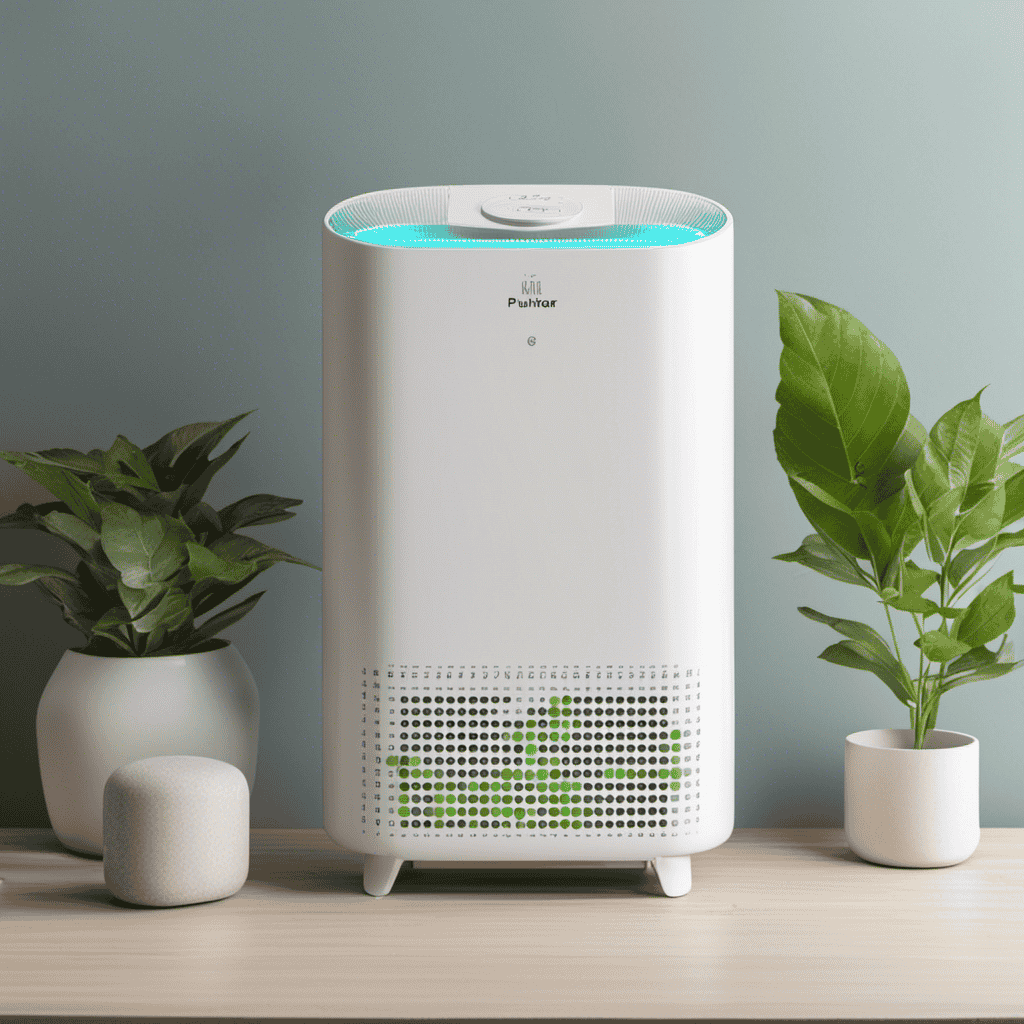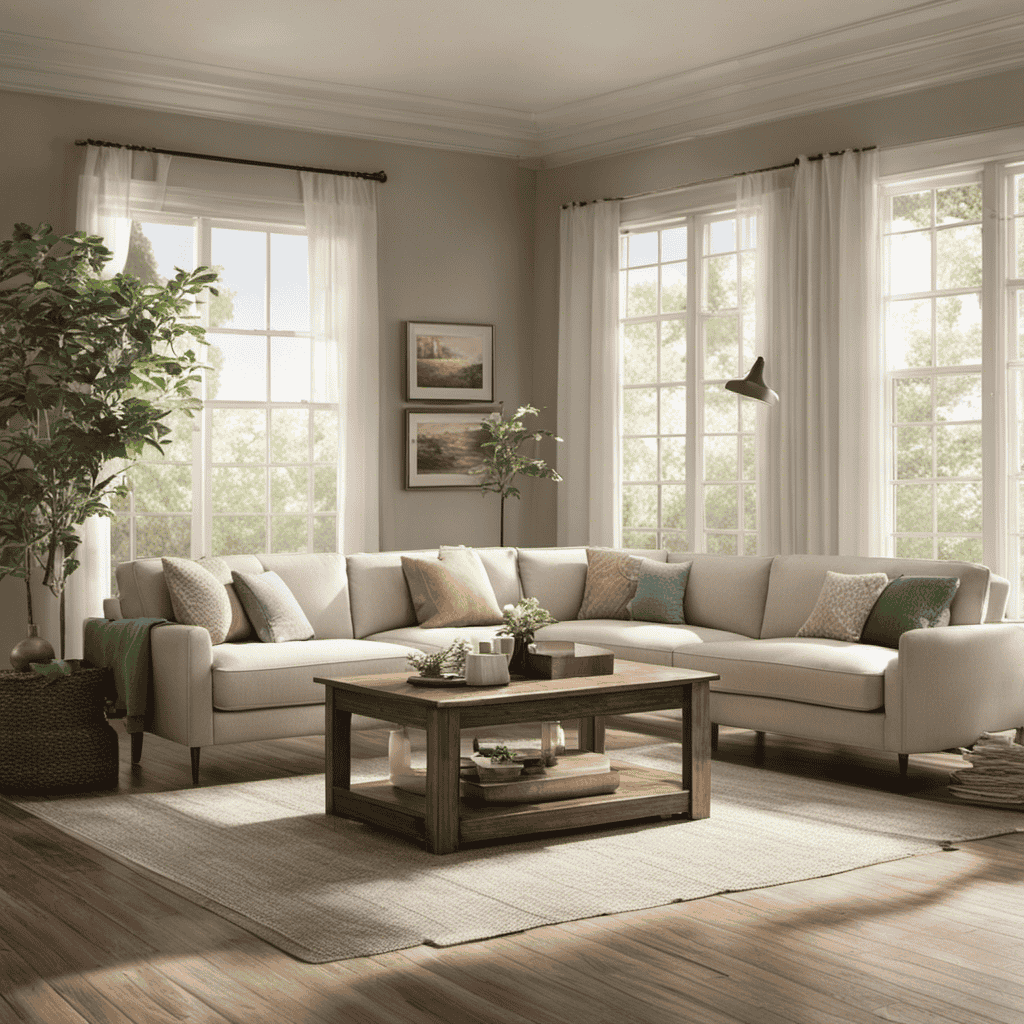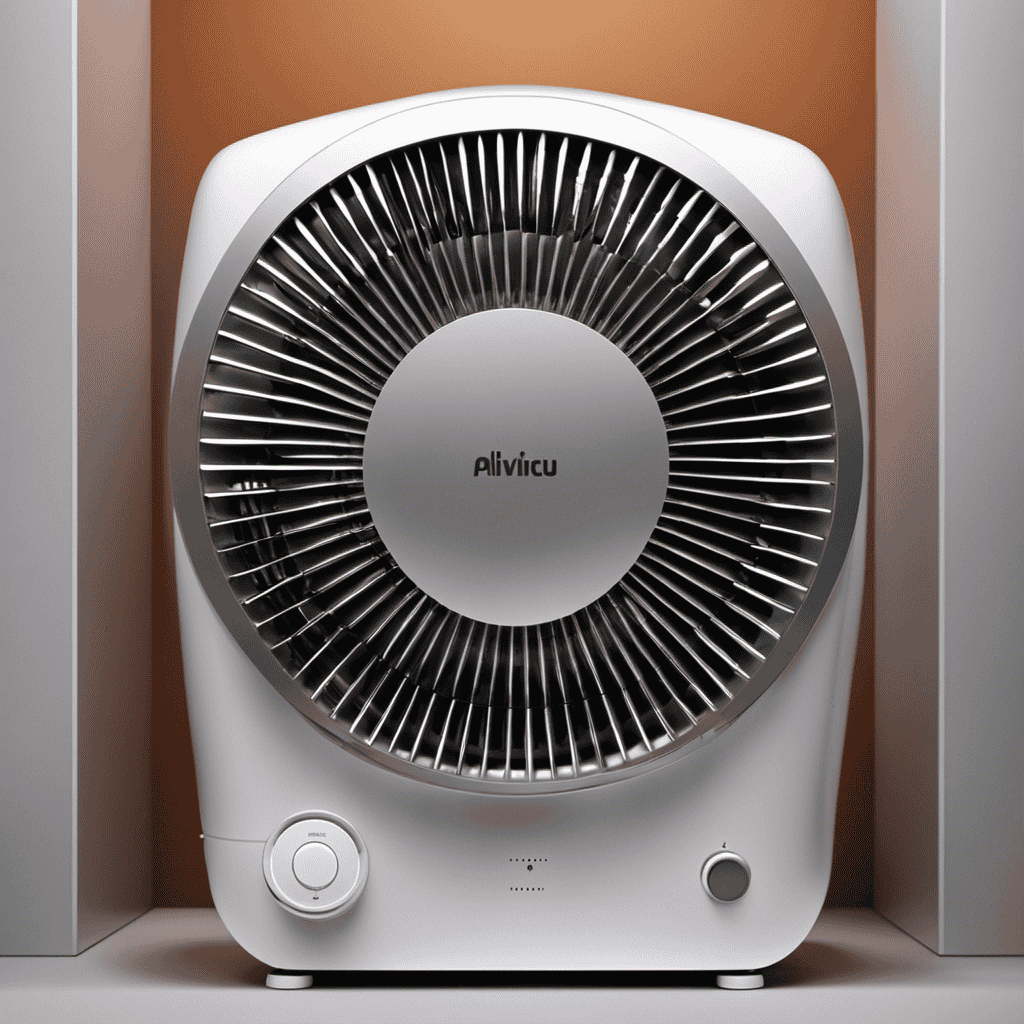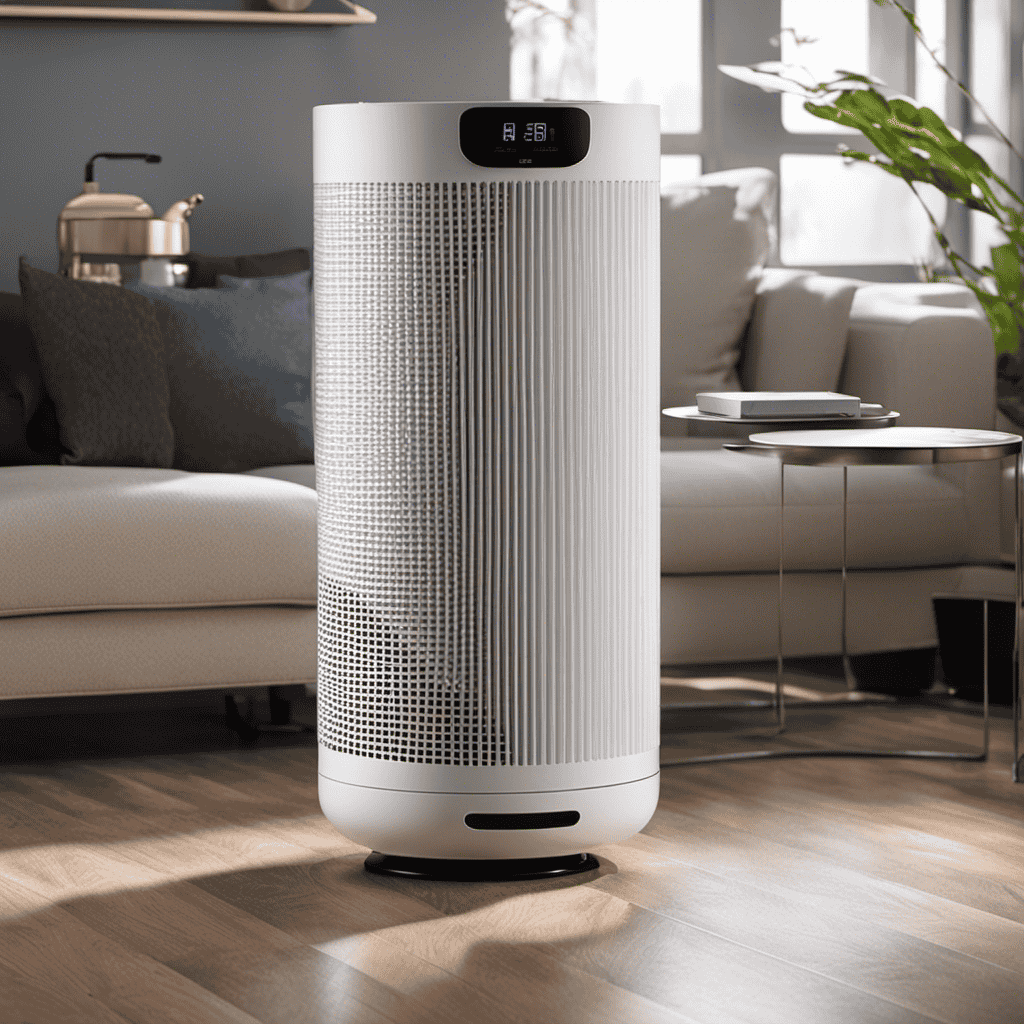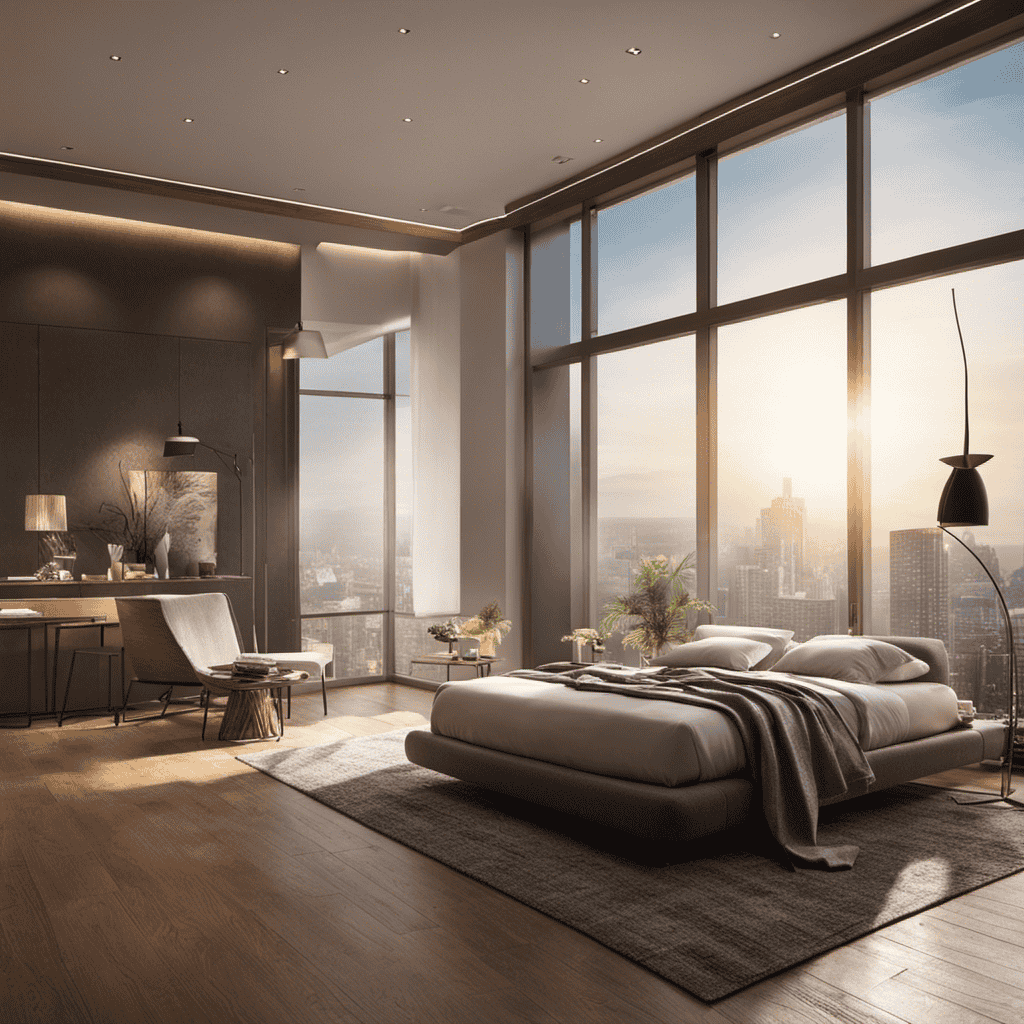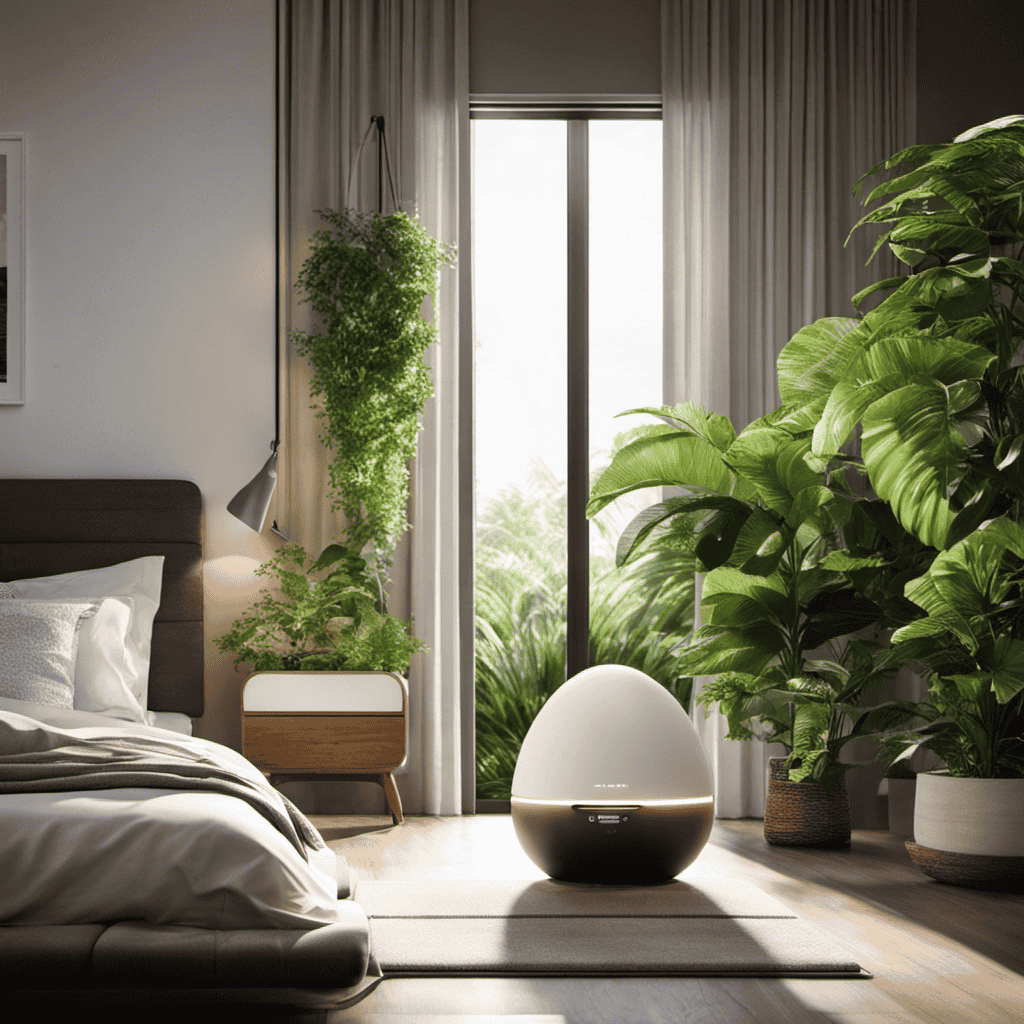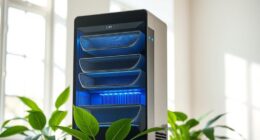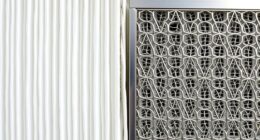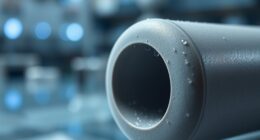Were you aware that the air within our houses may be up to five times more polluted than the air outside? This is why it is essential to routinely change the filters in your air purifier.
In this article, I’ll explain why regular air purifier filter replacement is important and the factors that determine how often you should do it. We’ll also explore the different types of air purifiers and how they affect filter replacement frequency.
So, let’s dive in and ensure the air we breathe is clean and healthy!
Key Takeaways
- Regular air purifier filter replacement is important for maintaining clean and healthy indoor air quality.
- Factors such as usage, air quality, manufacturer recommendations, and maintenance determine the frequency of filter replacement.
- Neglecting filter replacement leads to decreased efficiency, increased energy consumption, and signs such as decreased airflow and poor air quality.
- Different types of air purifiers have varying filter lifespan, with larger purifiers typically requiring less frequent replacement compared to smaller ones.
Why Regular Air Purifier Filter Replacement Is Important
Regular air purifier filter replacement is important because it helps maintain clean and healthy indoor air quality. By regularly replacing the filter, you can ensure that it is functioning at its highest efficiency and capturing the maximum amount of pollutants and allergens in the air.
This is crucial for individuals with respiratory conditions or allergies, as a dirty or clogged filter can worsen their symptoms. Additionally, regular filter replacement extends the lifespan of your air purifier. When the filter is clogged, the motor has to work harder to pull air through, leading to increased wear and tear on the unit.
Factors That Determine Filter Replacement Frequency
You should consider factors such as usage, air quality, and manufacturer recommendations to determine how frequently you need to replace your air purifier’s filter.
Here are four key factors that can impact the frequency of filter replacement:
-
Usage: If you use your air purifier constantly, such as in a high-traffic area or during peak allergy season, the filter will get dirty faster and require more frequent replacement.
-
Air Quality: If you live in an area with high levels of pollution or allergens, your filter will need to work harder and may need to be replaced more often.
-
Manufacturer Recommendations: Each air purifier model comes with specific guidelines from the manufacturer on when to replace the filter. It is important to follow these recommendations for optimal performance.
-
Maintenance: Regular maintenance, such as cleaning and vacuuming the filter, can extend its lifespan. However, even with proper maintenance, filters will eventually need replacement.
Considering these filter replacement factors and the impact of air quality, you can ensure that your air purifier is providing clean and healthy air for you and your family.
Understanding Filter Lifespan and Efficiency
When considering the lifespan and efficiency of your filter, it’s important to take into account factors such as usage, air quality, and manufacturer recommendations.
Regular air purifier maintenance is crucial to ensure optimal performance and longevity of your filter. It’s recommended to clean or replace your filter every 3-6 months, depending on usage and air quality.
Neglecting filter replacement can lead to decreased efficiency and increased energy consumption, resulting in higher filter replacement costs in the long run. By regularly inspecting and cleaning your filter, you can extend its lifespan and maintain its efficiency.
However, there are certain signs that indicate it’s time to replace your air purifier filter, such as decreased airflow, a noticeable decrease in air quality, and a significant increase in dust accumulation. Monitoring these indicators will help you determine when it’s time for a filter replacement.
Signs That Indicate It’s Time to Replace Your Air Purifier Filter
If you notice a significant decrease in airflow or a buildup of dust, it’s time to replace your air purifier filter. Regular filter replacement is essential to maintain the effectiveness and efficiency of your air purifier.
Here are some signs that indicate your filter is clogged and needs replacement:
-
Poor Air Quality: You may notice an increase in airborne allergens, such as dust, pollen, or pet dander, circulating in your home. This is a clear sign that your filter is no longer trapping these particles effectively.
-
Unpleasant Odors: A clogged filter can cause unpleasant odors to linger in your home. If you notice persistent smells that your air purifier used to eliminate, it’s a sign that your filter needs to be replaced.
-
Noisy Operation: A filter that is clogged with dirt and debris can strain the motor of your air purifier, resulting in increased noise during operation.
-
Decreased Airflow: If you feel a decrease in the airflow coming from your air purifier, it could indicate a clogged filter. This reduced airflow means that the purifier is not effectively cleaning the air in your home.
Regular filter replacement offers several benefits, including improved air quality, reduced allergens, and better overall performance of your air purifier. By replacing your filter as needed, you can ensure that your air purifier continues to provide clean and healthy air for you and your family.
How Different Types of Air Purifiers Affect Filter Replacement Frequency
The frequency of filter replacement varies depending on the type of air purifier you have and how often it is used.
One factor that affects the filter replacement frequency is the size of the air purifier. Larger air purifiers generally have bigger filters, which means they can capture more pollutants before needing to be replaced. This means that larger air purifiers may have a longer filter lifespan compared to smaller ones.
Another factor to consider is the usage time of the air purifier. If the air purifier is used for extended periods of time, such as running constantly or in a highly polluted environment, the filter will get clogged up faster and will need to be replaced more frequently.
Therefore, it is important to take into account both the size of the air purifier and the usage time when determining how often to replace the filter.
The Role of Air Quality in Determining Filter Replacement Frequency
In my experience with air purifiers, I’ve learned that the frequency of filter replacement is greatly influenced by the air quality of the environment. Monitoring the air quality is crucial in determining when to replace the filters.
Here are four key factors that affect filter replacement frequency:
-
Pollution levels: If you live in an area with high pollution, such as near a busy road or industrial zone, the filters will get clogged faster and require more frequent replacement.
-
Allergens and irritants: If you have allergies or suffer from respiratory conditions, like asthma, a higher presence of allergens and irritants in the air will require more frequent filter changes to maintain optimal air quality.
-
Seasonal variations: Different seasons bring different air pollutants. For example, pollen levels are higher in spring, while indoor pollutants like dust and pet dander may increase during winter when windows are closed.
-
Indoor activities: Activities such as cooking, smoking, or using chemical cleaning products can release pollutants into the air, leading to faster filter saturation and the need for more frequent replacements.
Tips for Extending the Lifespan of Your Air Purifier Filter
When it comes to maintaining the lifespan of your air purifier filter, utilizing effective cleaning techniques is crucial. Regularly cleaning your filter not only helps to remove dirt and debris, but it also ensures that it functions optimally in trapping pollutants.
Additionally, implementing certain practices can help prolong the overall lifespan of your filter. Avoiding excessive use of air fresheners and keeping your home clean and dust-free are two important factors to consider.
Effective Cleaning Techniques
To effectively clean your air purifier, you should consider using a combination of wiping down the exterior and vacuuming the filter. Here are some proven cleaning methods and innovative filtration techniques to ensure your air purifier is working at its best:
-
Carefully wipe down the exterior of the air purifier with a damp cloth to remove any dust or dirt that may have accumulated.
-
Gently remove the filter from the air purifier and use a vacuum cleaner with a brush attachment to remove any debris or particles trapped in the filter.
-
For a deeper clean, consider using compressed air to blow out any remaining dust or dirt from the filter.
-
If your air purifier has a washable filter, follow the manufacturer’s instructions for cleaning and drying the filter thoroughly before reinstalling it.
Prolonging Filter Lifespan
Regularly cleaning your air purifier’s filter can help extend its lifespan. There are various cleaning techniques that can effectively remove dirt, dust, and other particles from the filter, ensuring that it continues to function optimally.
One method is to use a vacuum cleaner with a brush attachment to gently remove debris from the surface of the filter. Another technique is to rinse the filter under running water, being careful not to use hot water or excessive pressure that could damage the filter. Additionally, using a soft brush or toothbrush to gently scrub the filter can help remove stubborn particles.
It is important to follow the manufacturer’s instructions when cleaning the filter to avoid causing any damage. By regularly cleaning your air purifier’s filter using these techniques, you can help prolong its lifespan and ensure that it continues to effectively remove contaminants from the air.
Common Mistakes to Avoid When Replacing Air Purifier Filters
Avoid these common mistakes when replacing your air purifier filters.
Proper air purifier filter maintenance is crucial for ensuring clean and healthy indoor air. However, many people make simple errors when it comes to replacing their filters, compromising the effectiveness of their air purifiers.
Here are the top four mistakes to avoid:
-
Neglecting regular replacement: Filters should be replaced according to the manufacturer’s recommendations. Ignoring this can lead to decreased air quality and an overworked purifier.
-
Using the wrong filter: Different air purifiers require specific filters. Using the wrong one can result in poor filtration and reduced performance.
-
Failing to clean pre-filters: Pre-filters trap large particles and should be cleaned regularly to maintain optimal airflow and prevent clogging.
-
Mishandling the filter: Rough handling or forcefully inserting the filter can damage it and affect its filtration capabilities.
The Impact of Filter Maintenance on Air Purifier Performance
When it comes to maintaining optimal performance and prolonging the lifespan of your air purifier, proper filter replacement is key.
The filter is the heart of the air purifier, responsible for trapping and removing pollutants from the air.
Regularly replacing the filter ensures that the air purifier can continue to effectively clean the air in your space, providing you with clean, fresh air to breathe.
Additionally, a dirty or clogged filter can reduce the efficiency of the air purifier, leading to decreased performance and potentially compromising the air quality in your environment.
Optimal Filter Replacement
It’s best to check the manufacturer’s recommendations for the optimal frequency of air purifier filter replacement. Following these guidelines can help prolong the filter efficiency and reduce filter replacement costs.
Here are four key reasons why regular filter replacement is essential:
-
Maintaining clean air: A clogged filter hinders the air purifier’s ability to effectively capture pollutants, reducing its overall performance. Regularly replacing the filter ensures clean and fresh air in your space.
-
Preventing health issues: A dirty filter can accumulate allergens, bacteria, and mold, which can be harmful to your health. Replacing the filter regularly helps prevent these contaminants from circulating in the air.
-
Improving energy efficiency: A clean filter allows the air purifier to operate efficiently, reducing energy consumption and saving you money on electricity bills.
-
Extending the lifespan of the air purifier: Regular filter replacement prevents strain on the motor and other components, helping to extend the overall lifespan of your air purifier.
Performance and Filter Lifespan
Regularly replacing the filter can significantly improve the performance and lifespan of your air purifier.
Understanding filter efficiency is crucial in maintaining the effectiveness of your purifier.
Filters work by trapping particles and pollutants in the air, preventing them from recirculating back into your living space.
Over time, these filters become clogged with trapped particles, reducing their efficiency and airflow.
By replacing the filter regularly, you ensure that your purifier continues to effectively remove harmful pollutants from the air, providing you with clean and healthy indoor air quality.
Regular maintenance not only improves the performance of your air purifier, but it also extends its lifespan, saving you money in the long run.
Now let’s explore how to choose the right replacement filter for your air purifier.
How to Choose the Right Replacement Filter for Your Air Purifier
To choose the right replacement filter for your air purifier, start by checking the model number on the current filter. This will ensure compatibility and prevent any issues with installation or performance.
Once you have the model number, follow these steps to find the perfect replacement:
-
Research: Look for affordable filters that offer high-quality air purification. Read reviews and compare prices to find the best option for your budget.
-
Filter Type: Determine the type of filter your air purifier uses. Common types include HEPA filters, activated carbon filters, and pre-filters. Each type has its own benefits and is designed to target specific pollutants.
-
Filter Size: Measure the dimensions of your current filter to ensure the replacement fits properly. Using the wrong size can lead to decreased efficiency and potentially damage your air purifier.
-
Replacement Schedule: Consider the manufacturer’s recommended replacement schedule. Some filters need to be replaced every few months, while others can last up to a year. This will help you plan and budget for future filter replacements.
The Importance of Properly Installing a New Air Purifier Filter
When it comes to ensuring efficient air purification, correct filter installation plays a crucial role. Properly installing a new air purifier filter is essential for optimal performance and maximum filtration effectiveness.
In this discussion, I will explore the importance of correct filter installation and how it contributes to efficient air purification.
Correct Filter Installation
Make sure you’re properly installing the air purifier filter to ensure optimal performance. Correct filter installation is crucial for the air purifier to effectively remove pollutants from your indoor air. Here are the common installation mistakes to avoid:
-
Placing the filter in the wrong direction: Ensure that the arrow on the filter aligns with the airflow direction indicated on the air purifier.
-
Failing to remove the plastic wrapping: Always remove any protective plastic covering before installing the filter to allow proper air circulation.
-
Forgetting to clean the filter housing: Before installing the new filter, clean the filter housing to remove any dust or debris that may have accumulated.
-
Neglecting to replace the filter regularly: Make sure to replace the air purifier filter according to the manufacturer’s recommendations to maintain optimal performance and clean air quality.
Efficient Air Purification
You can improve the efficiency of your air purification system by regularly cleaning the pre-filter.
Air purifier maintenance is crucial for ensuring clean and healthy indoor air quality.
The pre-filter acts as the first line of defense, capturing larger particles like dust, pet hair, and pollen before they reach the main filter.
Over time, these particles can accumulate and clog the pre-filter, reducing its effectiveness.
By cleaning the pre-filter on a regular basis, you can prevent this buildup and maintain optimal airflow.
This will not only improve the overall efficiency of your air purifier but also extend the lifespan of the main filter.
The Role of Filter Brands and Quality in Replacement Frequency
If you’ve chosen a top-quality filter brand for your air purifier, the frequency of replacement may be influenced. The quality of the filter plays a crucial role in its effectiveness and longevity. Here are four key factors to consider when comparing filter brands and understanding their impact on air purification:
-
Material: Look for filters made from high-quality materials like HEPA (High Efficiency Particulate Air) or activated carbon. These materials are known for their ability to capture and trap pollutants effectively.
-
Filtration Efficiency: Check the filter’s efficiency rating, which indicates how well it can remove particles of different sizes. A higher rating means better air purification.
-
Lifespan: Consider the filter’s lifespan before replacement. High-quality filters tend to last longer, reducing the frequency of replacements.
-
Maintenance: Some filter brands require regular cleaning, while others are disposable. Consider your preference and lifestyle when choosing a brand.
How Pets and Allergens Affect Air Purifier Filter Lifespan
Pets and allergens can significantly impact the lifespan of your air purifier’s filter. If you have pets at home, their fur, dander, and saliva can easily find their way into the air and get trapped in the filter. This accumulation of pet allergens can clog the filter quickly, reducing its effectiveness and lifespan.
To reduce pet allergens at home, regular grooming and vacuuming are essential. Brushing your pets outside can help minimize the amount of loose fur in your home, while vacuuming regularly can remove allergens from carpets and furniture.
Additionally, seasonal allergies can also play a role in the lifespan of your air purifier’s filter. During allergy seasons, there tends to be an increase in airborne allergens, such as pollen and mold spores, which can lead to a faster clogging of the filter.
Understanding how pets and allergens impact your air purifier’s filter lifespan is crucial in order to maintain clean and healthy indoor air.
Transitioning to the next section about ‘the link between indoor pollution and filter replacement frequency’, it is important to note that the presence of indoor pollutants can also affect the lifespan of your air purifier’s filter.
The Link Between Indoor Pollution and Filter Replacement Frequency
Transitioning to the link between indoor pollution and filter replacement frequency, it’s important to consider the impact of pollutants on how often you need to replace your air purifier’s filter. Maintaining clean air in your home is crucial for your health and well-being. Here are four key factors that contribute to the frequency of filter replacement:
-
The level of indoor air pollution: High levels of pollutants, such as smoke, pet dander, and dust, will require more frequent filter replacements to ensure effective air purification.
-
The size of your living space: Larger rooms or open floor plans will require more powerful air purifiers, meaning the filters may need to be replaced more often.
-
The number of occupants: If you have a large household or frequently have guests, the air purifier will be working harder and the filter may need to be replaced more frequently.
-
The overall air quality in your area: If you live in an area with poor outdoor air quality, your air purifier may need to work harder, leading to more frequent filter replacements.
Regular air purifier maintenance and timely filter replacements are essential for enjoying the benefits of clean air in your home. In the next section, we will explore recommended filter replacement schedules for different environments.
Recommended Filter Replacement Schedules for Different Environments
Now that we understand the importance of regularly replacing air purifier filters, let’s discuss some tips for maintaining filter efficiency and the impact of filter replacement on energy consumption.
To ensure optimal performance, it is recommended to clean or replace air purifier filters according to the manufacturer’s instructions. Some filters may need to be cleaned every few months, while others may need replacement every 6 to 12 months. It is crucial to follow these guidelines to maintain the filter’s efficiency in capturing pollutants effectively.
Regularly replacing filters not only ensures cleaner air but also contributes to energy savings. Clogged filters restrict airflow, causing the air purifier to work harder and consume more energy. By replacing filters on time, you can maintain the air purifier’s energy efficiency and reduce electricity consumption.
Frequently Asked Questions
Can I Reuse or Clean My Air Purifier Filter Instead of Replacing It?
I don’t recommend reusing or cleaning air purifier filters. It’s important to regularly replace them to ensure optimal air quality. Reusing or cleaning filters may compromise their effectiveness and potentially cause health issues.
How Do I Know if My Air Purifier Filter Needs to Be Replaced Sooner Than the Recommended Schedule?
If you’re wondering when to replace your air purifier filter, signs like reduced airflow or a musty smell indicate it might be time. Don’t wait for the recommended schedule, trust your senses!
Are There Any Specific Considerations for Filter Replacement if I Have Pets or Allergies?
If you have pets or allergies, it’s important to consider the increased pet shedding and common allergens in your home. This may result in more frequent air purifier filter replacements to maintain optimal air quality.
How Does the Quality of the Air Purifier Filter Impact Its Lifespan and Effectiveness?
The quality of the air purifier filter is crucial for its lifespan and effectiveness. Factors like air pollution can shorten the filter’s lifespan, while factors like size and material can impact its effectiveness.
Is There a Connection Between the Level of Indoor Pollution and the Frequency of Air Purifier Filter Replacement?
There is a connection between the level of indoor pollution and the frequency of air purifier filter replacement. Maintaining the filters is vital to ensure their effectiveness in removing pollutants and improving indoor air quality.
Conclusion
In conclusion, regularly replacing your air purifier filter is crucial for maintaining clean and healthy indoor air.
The frequency of replacement depends on various factors such as filter lifespan, efficiency, and the presence of pets or allergens.
Just like a garden needs tending to blossom, your air purifier filter needs to be replaced to ensure it continues to effectively remove pollutants from your environment.
By staying on top of filter replacement schedules, you can breathe easy knowing that your air is being filtered like a well-tended garden flourishing with fresh, clean air.
